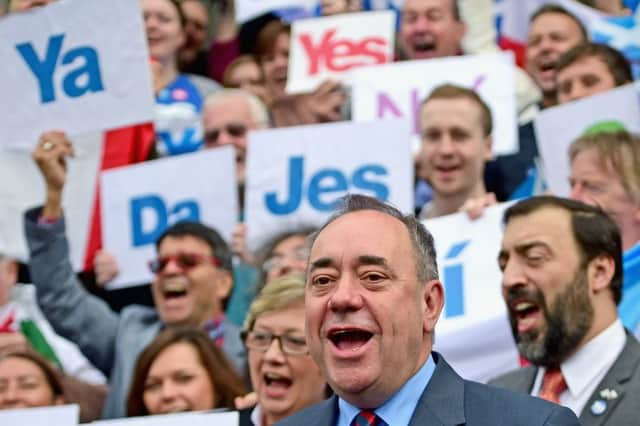Scott Macnab: Watch out, EU's door tends to slam


Just over two years ago, a group of Scottish journalists trooped over to Brussels for a series of briefings with senior EU politicians and officials about Scotland’s relationship with Brussels.
Of course, this was just months before the Scottish independence referendum and the prospect of the country remaining within the EU after a Yes vote was among the most contentious topics of the campaign.
Advertisement
Hide AdAdvertisement
Hide AdAlex Salmond and the Yes campaign were adamant that Scotland’s place at the heart of the EU was secure and wouldn’t skip a beat after independence. The No camp insisted that Scotland would find itself outside the EU and effectively having to re-apply for membership, which could take anything up to a decade.
Well after two days with the eurocrats, there was little doubt what the position was in Brussels. If Scotland voted to leave the UK, it would be leaving the EU as well. Subsequent public pronouncements from senior figures like the then EU President Jose Manuel Barroso made it clear that an independent Scotland could not expect any different treatment from other countries aspiring to join. As the former SNP deputy leader Jim Sillars put it recently, the EU effectively “slammed the door shut” in the face of the Scottish independence campaign.
The issue has reared its head again this week as Nicola Sturgeon raised the intriguing prospect of Scotland striking its own deal with the EU to “protect its relationship” with Brussels in the event of a Brexit vote against the will of Scots. This raised the stakes from the usual threat of a second independence referendum, as it becomes increasingly clear that the support just isn’t there at the moment for Yes to win. But forging its own ties with the EU would be a different matter and in line with the approach of a Nationalist regime in Scotland seeking to distance itself from the looming prospect of a post-Brexit “ring-wing Tory takeover,” of the UK Government as Ms Sturgeon put it recently.
Control over areas like trade deals certainly lies full square with Westminster. But in other areas, why couldn’t agreements be reached? Switzerland is firmly outside the EU but already has deals with Brussels in areas that would fall within the control of a devolved Scotland, such as the Erasmus student exchange programmes and the Horizon 2020 research programme for new and emerging technologies. The EU and Switzerland also have agreements allowing access to markets in road and rail transport.
And as Holyrood takes sweeping new controls over income tax rates and bands, Nicola Sturgeon will surely be interested in a historic tax transparency agreement signed between the EU and the Swiss government last year. This sees both sides automatically exchange information on the financial accounts of each other’s residents from 2018. Norway, whose success the SNP’s is so keen for Scotland to follow, is also not an EU member, but will contribute more than £3 billion to major EU programmes for research and innovation, education, and culture from 2014-20. It means that teachers, students, researchers as well as businesses and local councils in the Scandinavian nation can apply for funding from the EU.
And the importance of “wild Scotland” to tourism and economic growth means nationalist ministers will also be keen to remain part of key environmental protections which the EU provides such as the directives on birds and habitats.
Environment Secretary Roseanna Cunningham’s visit to the Loch Leven later today is part of a drive to underline the environmental protections that the EU legislates for and an indication she will seek to preserve these even if Scotland finds itself outside the EU.
Brexit would also give Holyrood sweeping new controls back from Brussels over key areas like agriculture and fisheries. One of the key issues facing the UK would be to replace the lucrative system of farm subsidies offered by the EU’s Common Agricultural Policy (CAP). Would it be impossible for Scotland to strike its own deal with the EU on farm subsidies? It’s certainly likely to be an area considered at the Scottish Government’s Brussels office if the vote goes against Remain tomorrow.
Advertisement
Hide AdAdvertisement
Hide AdThe control over fisheries would give Scotland some negotiating clout. The prospect of being frozen out of our lucrative waters is not something the Spanish and French will relish.
One thing that did become clear during the Scottish referendum was that the decision on such issues was not down to legal statute, but politics. The EU has no written constitution setting out who is responsible for making these decisions. The European Court of Justice has no jurisdiction in this area, while the European Commission is just an executive body. The real power in Brussels lies with the Council of Ministers, the de facto decision making body of member states.
When it comes to striking deals with a non-member state like Scotland, not even an independent country, it becomes a matter of national self interest. This is where Scotland ran into the real resistance in 2014. Many existing member states in the EU were grappling with their own independence movements. Spain was facing the prospect of Catalonia breaking free from Madrid rule, not to mention its history of Basque separatism, while Belgium has long been managing the Flemish movement for greater freedom in the Flanders region. Perhaps the most bizarre nationalist push came as calls emerged from a referendum in Venice on escaping the shackles of Italian state control.
Keen to defuse such agitation, it was increasingly clear that such EU nations were not about to make life easy for an independent Scotland joining the EU. But a Brexit vote would shift the whole political dynamic. And dealing with a non-independent Scotland may become more tenable for the EU. One in the eye even, for a truculent Westminster-based UK regime which had just turned its back on the EU club after 40 years.